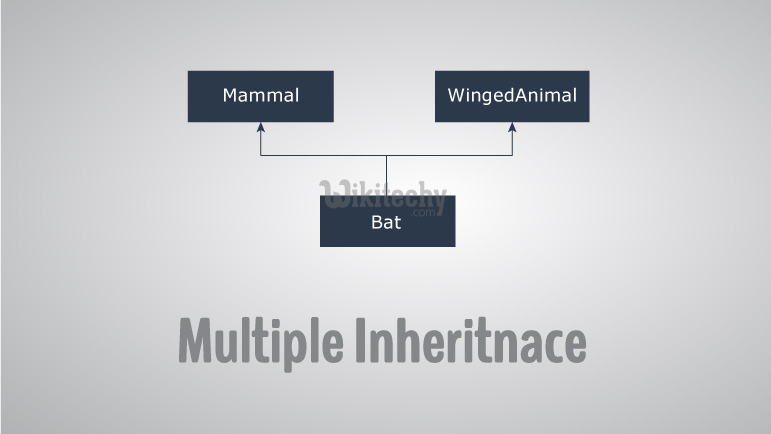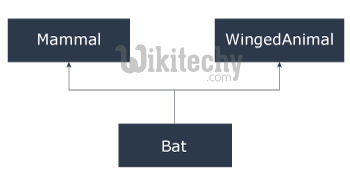C++ Multiple Inheritance | Hierarchical Inhertiance - Learn C++ - C++ Tutorial - C++ programming

Learn c++ - c++ tutorial - c++-multiple-inheritance - c++ examples - c++ programs
- In this, we will discuss about different models of inheritance in C++ programming: Multiple, Multilevel and Hierarchical inheritance with examples.

- Inheritance is one of the core feature of an object-oriented programming language. It allows software developers to derive a new class from the existing class. The derived class inherits the features of the base class (existing class).
- There are various models of inheritance in C++ programming.
C++ Multilevel Inheritance
- In C++ programming, not only you can derive a class from the base class but you can also derive a class from the derived class. This form of inheritance is known as multilevel inheritance.

learn c++ tutorials - multiple inheritance in c++ Example
class A
{
... .. ...
};
class B: public A
{
... .. ...
};
class C: public B
{
... ... ...
};
- Here, class B is derived from the base class A and the class C is derived from the derived class B.
Example 1: C++ Multilevel Inheritance
#include <iostream>
using namespace std;
class A
{
public:
void display()
{
cout<<"Base class content.";
}
};
class B : public A
{
};
class C : public B
{
};
int main()
{
C obj;
obj.display();
return 0;
}
Learn C++ , C++ Tutorial , C++ programming - C++ Language -Cplusplus
Output
Base class content- In this program, class C is derived from class B (which is derived from base class A).
- The obj object of class C is defined in the main() function.
- When the display() function is called, display() in class A is executed. It's because there is no display() function in class C and class B.
- The compiler first looks for the display() function in class C. Since the function doesn't exist there, it looks for the function in class B (as C is derived from B).
- The function also doesn't exist in class B, so the compiler looks for it in class A (as B is derived from A).
- If display() function exists in C, the compiler overrides display() of class A (because of member function overriding).
C++ Multiple Inheritance
- In C++ programming, a class can be derived from more than one parents.
- For example: A class Bat is derived from base classes Mammal and WingedAnimal. It makes sense because bat is a mammal as well as a winged animal.

Learn C++ , C++ Tutorial , C++ programming - C++ Language -Cplusplus
Example 2: Multiple Inheritance in C++ Programming
- This program calculates the area and perimeter of an rectangle but, to perform this program, multiple inheritance is used.
#include <iostream>
using namespace std;
class Mammal {
public:
Mammal()
{
cout << "Mammals can give direct birth." << endl;
}
};
class WingedAnimal {
public:
WingedAnimal()
{
cout << "Winged animal can flap." << endl;
}
};
class Bat: public Mammal, public WingedAnimal {
};
int main()
{
Bat b1;
return 0;
}
Output
Mammals can give direct birth.
Winged animal can flap.
Learn C++ , C++ Tutorial , C++ programming - C++ Language -Cplusplus
Ambiguity in Multiple Inheritance
- The most obvious problem with multiple inheritance occurs during function overriding.
- Suppose, two base classes have a same function which is not overridden in derived class.
- If you try to call the function using the object of the derived class, compiler shows error. It's because compiler doesn't know which function to call. For example,
class base1
{
public:
void someFunction( )
{ .... ... .... }
};
class base2
{
void someFunction( )
{ .... ... .... }
};
class derived : public base1, public base2
{
};
int main()
{
derived obj;
obj.someFunction() // Error!
}
- This problem can be solved using scope resolution function to specify which function to class either base1 or base2
int main()
{
obj.base1::someFunction( ); // Function of base1 class is called
obj.base2::someFunction(); // Function of base2 class is called.
}Learn C++ , C++ Tutorial , C++ programming - C++ Language -Cplusplus
C++ Hierarchical Inheritance
- If more than one class is inherited from the base class, it's known as hierarchical inheritance. In hierarchical inheritance, all features that are common in child classes are included in the base class.
- For example: Physics, Chemistry, Biology are derived from Science class.
Learn C++ , C++ Tutorial , C++ programming - C++ Language -Cplusplus
Syntax of Hierarchical Inheritance
class base_class {
... .. ...
}
class first_derived_class: public base_class {
... .. ...
}
class second_derived_class: public base_class {
... .. ...
}
class third_derived_class: public base_class {
... .. ...
}
public class ClassA
{
public void dispA()
{
System.out.println("disp() method of ClassA");
}
}
public class ClassB extends ClassA
{
public void dispB()
{
System.out.println("disp() method of ClassB");
}
}
public class ClassC extends ClassA
{
public void dispC()
{
System.out.println("disp() method of ClassC");
}
}
public class ClassD extends ClassA
{
public void dispD()
{
System.out.println("disp() method of ClassD");
}
}
public class HierarchicalInheritanceTest
{
public static void main(String args[])
{
//Assigning ClassB object to ClassB reference
ClassB b = new ClassB();
//call dispB() method of ClassB
b.dispB();
//call dispA() method of ClassA
b.dispA();
//Assigning ClassC object to ClassC reference
ClassC c = new ClassC();
//call dispC() method of ClassC
c.dispC();
//call dispA() method of ClassA
c.dispA();
//Assigning ClassD object to ClassD reference
ClassD d = new ClassD();
//call dispD() method of ClassD
d.dispD();
//call dispA() method of ClassA
d.dispA();
}
}
Output :
disp() method of ClassB
disp() method of ClassA
disp() method of ClassC
disp() method of ClassA
disp() method of ClassD
disp() method of ClassA
